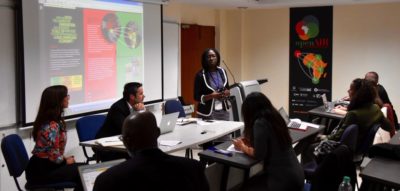By Victor Nzomo
In the midst of two decades of TRIPS and three decades of openness, more than 400 delegates from over 50 countries converged in New Delhi for the 4th Global Congress on Intellectual Property and the Public Interest (GCIP). Participants ranged from established academics to students and activists in the field of intellectual property (IP). Over a period of three days, GCIP delegates met at the National Law University to discuss a host of topics under four broad themes: Users’ Rights, Openness, IP and Development, and Access to Medicines.
Right from the inaugural plenary session, delegates were called upon to reflect on the progress of the Global Congress in the re-articulation of a public interest agenda for IP; advocating for a new IP system that protects public goods such as access to education and medications. Throughout the Congress, the need to counter the popular narrative of IP as a driver of innovation was repeatedly stressed. An example that was cited by Zakir Thomas is that TRIPS, based on the classical interpretation that higher IP protection will attract investment and facilitate R&D, is an instrument meant to further IP-driven innovation. Despite this, there are several areas where innovation has not increased even with the presence of TRIPS-compliant laws. For instance, there are some countries with stronger IP laws than the US, yet companies have not significantly invested in R&D in those countries. This is especially the case for many countries in Africa who have TRIPS-complaint IP laws, yet have had limited transfer and investment in R&D. Therefore, several speakers including OPEN AIR’s Prof. Nagla Rizk submitted that the innovation space is a complex ecosystem where IP is only one of the factors that impact upon this ecosystem, rather than being the sole determinant of innovation.
“… [it was] submitted that the innovation space is a complex ecosystem where IP is only one of the factors that impact upon this ecosystem, rather than being the sole determinant of innovation.”
There were several presentations by Open AIR researchers including by several of our Fellows. The most memorable for me, however, was the panel discussion led by Open AIR on the subject of “Sustainability of Research Networks Working in the Global South on IP, Innovation, and Development”. The Panel was chaired by Prof. Caroline Ncube, who invited contributions from her fellow Open AIR Steering Committee Members and some of the student Fellows present. The achievements of the Open AIR Project are epitomized in the award of a prestigious multimillion dollar Partnership Grant from the Social Sciences and Humanities Research Council (SSHRC) of Canada – the largest SSHRC grant given – in order to advance the network and Open AIR’s research on critical issues related to IP. Professors Jeremy de Beer and Chidi Oguamanam explained that the Open AIR network strongly believes that Africans have as much to teach developed economies about innovation and entrepreneurship as they do to learn. With the necessary long-term funding and structures now in place, the Open AIR network will continue to grow and to engage in cross-parallel research in order to propose global policies and policy solutions that will help IP to stimulate innovation.
“Professors Jeremy de Beer and Chidi Oguamanam explained that the Open AIR network strongly believes that Africans have as much to teach developed economies about innovation and entrepreneurship as they do to learn.”
Ultimately, the Open AIR network aims to change the narratives around innovation and development in Africa through an evidence-based research approach. Through its work, Open AIR will question the assumptions made about Africa and find new metrics that will take into account the contextual realities at play across the continent.
As a young scholar, to me the most exciting part of the Open AIR network is its demonstrated commitment to the training and mentorship of up-and-coming researchers. Open AIR’s New and Emerging Researchers Group (NERG) is a group of undergraduate graduate, and post-graduate students who have been awarded the chance to work with Open AIR as Fellows. Through NERG, we have the opportunity to interact and share insights and experiences with our peers, while also learning from Open AIR’s professors and practitioners, who are all leaders in their respective fields. As a result, the Open AIR NERG Fellows not only receive training and mentoring opportunities, but we are also embedded in influential professional networks that will help us to successfully launch our careers. Several Open AIR NERG Fellows attended GCIP and presented at the congress, including Nagham el Houssamy, Helen Chuma-Okoro, and myself.
In conclusion, the Global Congress was an incredible experience to learn and exchange with some of the leading IP professionals worldwide on how best the IP system can serve the public interest. The Congress was an eye-opener for me, showing that Open AIR is part of a wider community of like-minded individuals and institutions around the world working very hard to develop new perspectives on the role of IP in innovation. In 2017, I look forward to being a part of the 5thGlobal Congress and presenting our Open AIR research findings on the theme of High Technology hubs.








